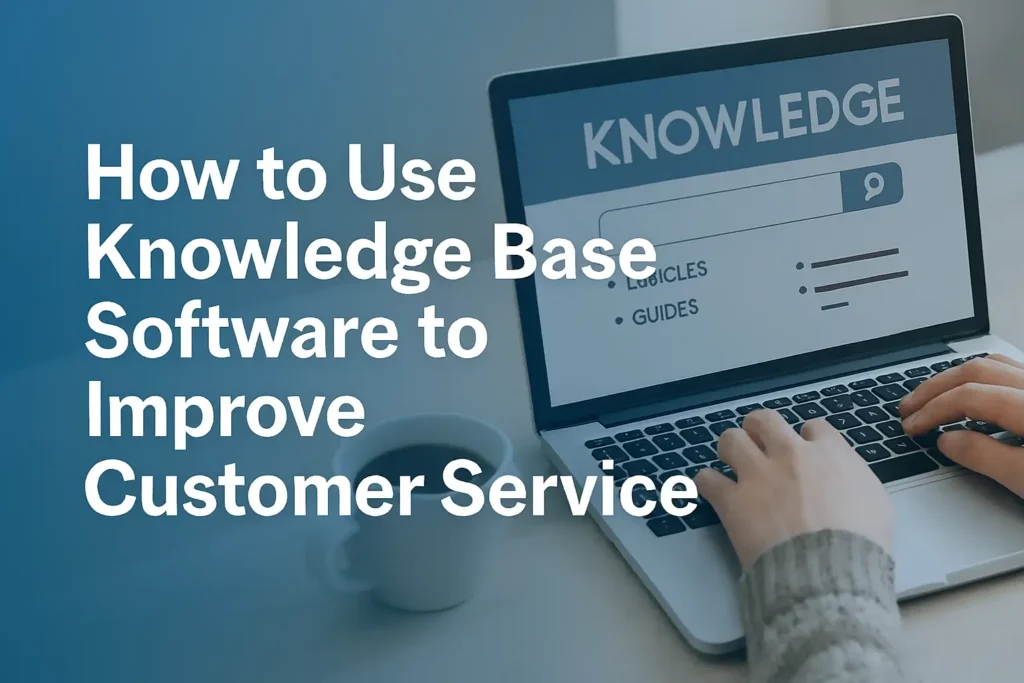Customers now demand quick, effective support in a world that moves at a breakneck pace. The era of enduring long wait times and receiving uninspired, generic replies has passed. Across the United States and the United Kingdom, businesses are increasingly finding that outstanding customer service is a powerful differentiator and a key driver of loyalty. Among the most potent tools available to any customer service team is a well-implemented knowledge base.
A knowledge base serves as a self-service hub containing a wealth of information about your products, services, and processes. It empowers customers to find answers to their questions independently, reducing their reliance on direct agent interaction. But its benefits extend far beyond just deflecting tickets. Here’s how to strategically use knowledge base software to significantly improve your customer service:

1. Empowering Customers with Self-Service:
The most immediate impact of a knowledge base is its ability to empower customers to resolve issues on their own, 24/7.
- Comprehensive FAQs: A well-structured FAQ section addresses common questions and concerns, providing instant answers without the need for customers to contact support.
- How-To Guides and Tutorials: Detailed guides and step-by-step tutorials help customers understand product features, troubleshoot common problems, and get the most out of your offerings.
- Troubleshooting Articles: Proactive creation of articles addressing known issues and their solutions can significantly reduce support inquiries related to these problems.
- Search Functionality: A robust search engine within your knowledge base is crucial. It allows customers to quickly find relevant information using keywords and natural language queries.
By providing readily available and easily searchable information, you reduce the volume of incoming support tickets, freeing up your agents to handle more complex and urgent issues. This leads to faster resolution times and increased customer satisfaction.
2. Providing Consistent and Accurate Information:
A centralized knowledge base ensures that all customers receive consistent and accurate information, regardless of how they choose to interact with your company.
- Single Source of Truth: By housing all relevant information in one place, you eliminate the risk of conflicting or outdated information being shared across different channels.
- Agent Empowerment: Your support agents can also leverage the knowledge base to quickly find answers and provide consistent responses to customers, regardless of the agent’s individual experience level.
- Brand Consistency: Ensure the tone and language used in your knowledge base align with your brand voice, providing a seamless customer experience across all touchpoints.
This consistency builds trust and confidence in your brand and ensures that customers receive the right information the first time.
3. Improving Agent Efficiency and Productivity:
While a knowledge base empowers self-service, it also significantly enhances the efficiency and productivity of your support team.
- Faster Resolution Times: Agents can quickly access pre-approved answers and solutions from the knowledge base, reducing the time spent researching and formulating responses.
- Reduced Training Time: New agents can quickly onboard and become proficient by utilizing the comprehensive information available in the knowledge base.
- Focus on Complex Issues: By deflecting common inquiries through self-service, agents can dedicate more time and attention to resolving complex or high-priority issues that require human intervention.
- Consistent Agent Responses: The knowledge base provides a framework for consistent and accurate agent responses, improving the overall quality of support.
By equipping your agents with a readily available repository of information, you enable them to handle more tickets effectively and provide a higher level of service.
4. Enhancing Proactive Support:
A knowledge base can be used proactively to anticipate customer needs and address potential issues before they even arise.
- Onboarding Resources: Provide new customers with comprehensive guides and tutorials to help them get started with your products or services seamlessly.
- Proactive Notifications: Link relevant knowledge base articles in onboarding emails or in-app messages to guide users through key features and address potential pain points.
- Content Based on Support Trends: Analyze support ticket trends to identify recurring issues and proactively create knowledge base articles addressing these topics, potentially preventing future inquiries.
This proactive approach demonstrates your commitment to customer success and helps customers avoid frustration.
5. Gathering Valuable Customer Insights:
Analyzing how customers interact with your knowledge base can provide valuable insights into their needs and pain points.
- Popular Articles: Identify the articles that are most frequently viewed, indicating common customer questions and areas of interest.
- Search Queries: Analyze the search terms used by customers to understand what information they are actively seeking. High volumes of unsuccessful searches can highlight gaps in your knowledge base content.
- Feedback Mechanisms: Implement feedback options on articles (e.g., “Was this helpful?”) to gauge the effectiveness of your content and identify areas for improvement.
These insights can inform your product development, marketing efforts, and overall customer service strategy, allowing you to continuously improve the customer experience.
In conclusion, knowledge base software is no longer a luxury but a necessity for businesses in India aiming to deliver exceptional customer service. By strategically implementing and maintaining a comprehensive and user-friendly knowledge base, you can empower your customers, enhance the efficiency of your support team, ensure consistent information delivery, provide proactive support, and gain valuable insights into your customers’ needs. This ultimately leads to increased customer satisfaction, loyalty, and a stronger brand reputation in a competitive marketplace.
Read: Top Internal Knowledge Base Tools to Power Team Productivity in 2025
